Related Research Articles
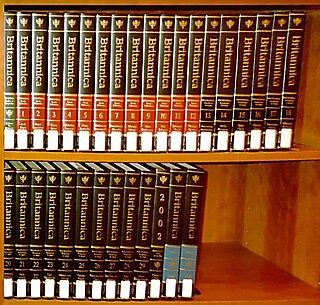
An encyclopedia, or encyclopaedia is a reference work or compendium providing summaries of knowledge either general or special to a particular field or discipline. Encyclopedias are divided into articles or entries that are arranged alphabetically by article name or by thematic categories, or else are hyperlinked and searchable by random access. Encyclopedia entries are longer and more detailed than those in most dictionaries. Generally speaking, encyclopedia articles focus on factual information concerning the subject named in the article's title; this is unlike dictionary entries, which focus on linguistic information about words, such as their etymology, meaning, pronunciation, use, and grammatical forms.

Encyclopedia Americana is a general encyclopedia written in American English. It was the first major multivolume encyclopedia that was published in the United States. Following the acquisition of Grolier in 2000, the encyclopedia has been produced by Scholastic.

Ephraim Chambers was an English writer and encyclopaedist, who is primarily known for producing the Cyclopaedia, or a Universal Dictionary of Arts and Sciences.

Cyclopædia: or, An Universal Dictionary of Arts and Sciences is an encyclopedia prepared by Ephraim Chambers and first published in 1728; six more editions appeared between 1728 and 1751 with a Supplement in 1753. The Cyclopædia was one of the first general encyclopedias to be produced in English.
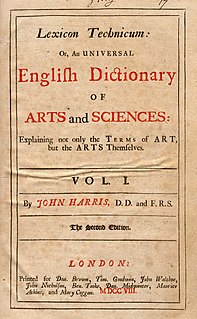
Lexicon Technicum: or, An Universal English Dictionary of Arts and Sciences: Explaining not only the Terms of Art, but the Arts Themselves was in many respects the first alphabetical encyclopedia written in English. Although the emphasis of the Lexicon Technicum was on mathematical subjects, its contents go beyond what would be called science or technology today, in conformity with the broad eighteenth century understanding of the terms "arts" and "science," and it includes entries on the humanities and fine arts, notably on law, commerce, music, and heraldry. However, the Lexicon Technicum neglects theology, antiquity, biography, and poetry.

Chambers's Encyclopaedia was founded in 1859 by William and Robert Chambers of Edinburgh and became one of the most important English language encyclopaedias of the 19th and 20th centuries, developing a reputation for accuracy and scholarliness that was reflected in other works produced by the Chambers publishing company. The encyclopaedia is no longer produced. A selection of illustrations and woodblocks used to produce the first two editions of the encyclopaedia can be seen on a digital resource hosted on the National Museums Scotland website.
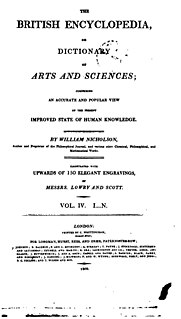
The British Encyclopedia, or Dictionary of Arts and Sciences, claimed by its publishers to be a work "Comprising an accurate and popular view of the present improved state of human knowledge", was published at London in 1809 in six octavo volumes and around 150 plates.

The Encyclopædia Perthensis was a publishing project around the Morison Press in Perth, Scotland undertaken in the 1790s, with the involvement of James Morison. Morison went into partnership with Colin Mitchel and Co.
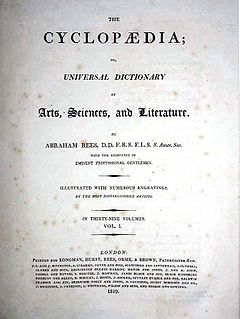
Rees's Cyclopædia, in full The Cyclopædia; or, Universal Dictionary of Arts, Sciences, and Literature was an important 19th-century British encyclopaedia edited by Rev. Abraham Rees (1743–1825), a Presbyterian minister and scholar who had edited previous editions of Chambers's Cyclopædia.

The Enciclopedia Italiana di Scienze, Lettere e Arti, best known as Treccani for its developer Giovanni Treccani or Enciclopedia Italiana, is an Italian-language encyclopaedia. The publication Encyclopaedias: Their History Throughout The Ages regards it as one of the greatest encyclopaedias along with the Encyclopædia Britannica and others.

Isaac Taylor was an English philosophical and historical writer, artist, and inventor.
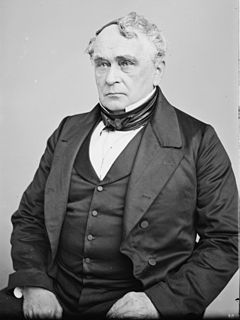
Francis Lieber, known as Franz Lieber in Germany, was a German-American jurist, gymnast and political philosopher. He edited an Encyclopaedia Americana. He was the author of the Lieber Code during the American Civil War, also known as Code for the Government of Armies in the Field (1863). The Lieber Code is considered the first document to comprehensively outline rules regulating the conduct of war, and laid the foundation for the Geneva Conventions.
The Popular Encyclopedia or Conversations Lexicon was a British encyclopedia that was published from 1837 to 1893 by Blackie and Son, of Glasgow. It was originally a reprint of Francis Lieber's Encyclopedia Americana, itself based on the Brockhaus Enzyklopädie.
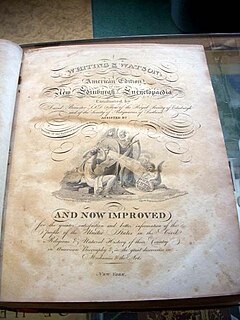
The Edinburgh Encyclopædia is an encyclopaedia in 18 volumes, printed and published by William Blackwood and edited by David Brewster between 1808 and 1830. In competition with the Edinburgh-published Encyclopædia Britannica, the Edinburgh Encyclopædia is generally considered to be strongest on scientific topics, where many of the articles were written by the editor.
The Encyclopædia Edinensis was a six-volume general encyclopedia published in Edinburgh in 1827, and intended for a popular audience. It was edited by James Millar, who died just before it was complete.
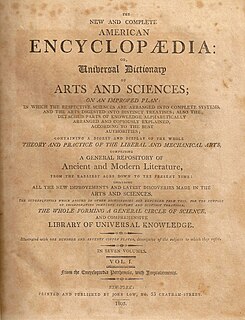
Low's Encyclopædia is an early American encyclopedia, titled The New and Complete American Encyclopædia or Universal Dictionary of Arts and Sciences. It was published in New York City, from 1805 to 1811. Consisting of seven volumes quarto, it is noteworthy among America's earliest encyclopedias for having been written in the United States, as opposed to being an American reprint of a British work, as were, for examples, Dobson's Encyclopedia, the Bradford printing of Rees's Cyclopædia, Samuel A. Mitchell's American printing (1816) of the British Encyclopedia, or Dictionary of Arts and Sciences (1809), or the Birch and Small printing of the Domestic Encyclopedia.
The Complete Dictionary of Arts and Sciences was an encyclopedia edited by Thomas Henry Croker. It is notable for being published in Coventry – the first English encyclopedia published outside London.